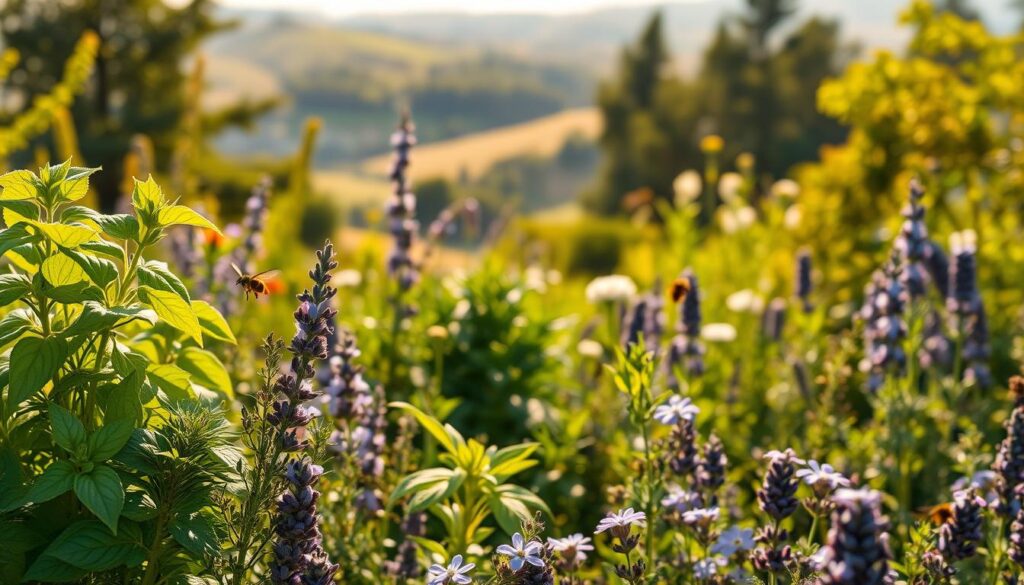Welcome to your essential guide on herbal gardening. This is where dreams of a lush garden become real. We’re here to help both new and experienced gardeners with awesome tips for their gardens.

Seek App
Enjoy the health perks of fresh herbs and learn about soil prep and pest control. Everything you need to boost your gardening game is right here. Dive into practical advice that will help your herb garden bloom.
Anúncios
Understanding the Benefits of Herbal Gardening
Herbal gardening brings many gains, like healthier eating and tastier food. It allows gardeners to have fresh, nutritious produce at home. Growing your own herbs makes meals more flavorful and boosts your health too.
Health Benefits of Fresh Herbs
Homegrown herbs are full of important vitamins and antioxidants. Using them in your food helps keep your diet balanced and healthy. For example, basil and cilantro reduce inflammation. Likewise, parsley gives you vitamin C and iron. Having these power-packed herbs from your garden makes living healthily easier.
Anúncios
Culinary Uses of Homegrown Herbs
Herbs like rosemary, thyme, and dill make meals stand out. They can be used in salads, sauces, or as marinades, improving taste and adding beauty. Fresh herbs from the garden encourage you to be creative in your cooking, leading to enjoyable meal times.

Choosing the Right Location for Your Garden
Finding the perfect spot for a herb garden is crucial for its growth. Culinary herbs do well with lots of sunlight. Knowing how much sun each plant needs helps your herb garden thrive.
Importance of Sunlight for Herbs
Most herbs love getting at least six hours of direct sunlight daily. This sunlight not only makes them tastier but also keeps them healthy. So, when picking a spot for your herb garden, look for places that get steady light all day. This is key for gardening outside.
If you can’t garden outside, a south-facing window indoors can work well too.
Outdoor vs Indoor Gardening Considerations
Gardening outside is often best because of the natural sunlight and air flow. But if you can only garden inside, you’ll need to work harder to mimic outdoor conditions. Putting your herbs where they get the most light or using grow lights can really help. Choosing the right spot for each herb means your garden will do great.
Soil Preparation for a Flourishing Herb Garden
Getting the soil right is key to a great herb garden. You need the right soil mix that helps herbs grow well. It needs the right nutrients and good drainage. This is your first step to a lush garden.
Creating a Well-Draining Soil Mix
A mix of topsoil, compost, and coarse sand is the best. This setup mimics the natural setting for many herbs. It prevents roots from sitting in water, which can cause damage. Adding organic matter like peat moss helps with air and nutrients.
Importance of Nutrients in Soil
Nutrients are crucial for herb growth. A soil rich in nutrients leads to healthy plants and more herbs. Add things like earthworm castings to your soil. This improves nutrient levels and encourages good microbes. This will keep your garden healthy and productive.
Starting Your Herbal Gardening Journey
Starting an herb garden is an exciting adventure. It offers both cooking delights and health perks. Picking the right place to begin is key for success. Searching for the best places for your herb garden will make sure you get strong plants and seeds for your area.
Best Places to Buy Herb Plants
Think carefully about where to buy your herb plants. Local nurseries usually have fresher and healthier plants than big stores. Consider these spots:
- Local nurseries: They typically sell plants that are acclimated to your region.
- Farmers’ markets: Here, you can often find organic plants from local growers.
- Specialty herb shops: These stores focus exclusively on herbs and can offer a diverse range.
Starting with Seeds vs. Seedlings
Deciding between seeds and seedlings is important for your herbs’ growth. Some herbs do better from seeds, while others from seedlings. Think about the following:
- Cilantro and parsley are frequently easier to grow from seeds.
- Herbs like basil and mint can be started from seedlings for quicker yields.
- Prioritize organic and non-GMO seeds from reputable suppliers.
Essential Supplies for Successful Herbal Gardening
Having the right supplies will help your herb garden succeed. Good gardening tools make planting and upkeep easier, helping your herbs grow well. Quality supplies matter a lot, whether you’re gardening inside or outside.
Tools Needed for Planting and Maintenance
To begin growing herbs, you’ll need some key tools:
- Trowels for digging and planting.
- Watering cans for precise watering.
- Herb scissors for trimming and harvesting.
- Rakes and hoes for soil preparation.
- Gloves to protect your hands.
These tools help create a good environment for your herbs. They let you take care of your herbs well.
Recommended Grow Lights for Indoor Herbs
If you’re growing herbs inside, you’ll need the right grow lights. These lights ensure your herbs get enough light, especially when it’s dark outside. You should look for grow lights that have:
- Full-spectrum light to mimic natural sunlight.
- Energy-efficient LED options for lower electric costs.
- Adjustable height settings to accommodate growing plants.
Choosing the proper grow lights makes indoor gardening better. It helps your herbs grow strong, no matter the weather outside.
Watering and Fertilizing Your Herbs
For your herbs to thrive, proper watering and fertilizing are key. Knowing how much water each herb needs is crucial for their growth. Some herbs like it wet, while others do better in dry soil. By understanding these needs, you can boost your garden’s health and make it more fruitful.
Understanding Different Watering Needs
It’s important to keep the soil’s moisture just right for your herbs. But too much water can harm them. Here’s what to keep in mind:
- Check the soil’s wetness often. For example, basil loves moist soil, but rosemary prefers it on the dry side.
- Adjust watering with the seasons. Herbs usually need less water when it’s cold.
- Use mulch to help the soil hold onto moisture and reduce water loss.
Organic Fertilizers for Healthier Growth
Using organic fertilizers can make your soil better and your plants healthier. There are many good choices:
- Compost enriches soil and its structure with vital nutrients.
- Worm castings are a top choice for boosting growth.
- Fish emulsion is an effective liquid fertilizer that promotes fast growth.
Essential Care Tips for Herbal Gardening
Looking after your herbs involves combining several care methods. Learning to trim herbs and place them well boosts their growth. Use these tips for a garden full of healthy, productive plants.
Trimming and Pruning Techniques
Regular cuts make herbs grow thick and stop them from flowering too soon. Flowering takes energy from leaf growth. Here’s how to do it right:
- Use sharp, clean shears for clean cuts.
- Remove leaves that are dead or turning yellow.
- Trim stems to spur new leaves.
Grouping Plants with Similar Watering Needs
Putting plants with the same thirst together is smart. It cuts down on water fights and makes care easier. When you set up your garden, remember these points:
- Find and group herbs that like it wet, for example, basil and cilantro.
- Keep those that can handle dryness, like rosemary and thyme, together.
- Check how much sun each group needs to really thrive.
Common Pests and Solutions in Herbal Gardening
Keeping pests away is crucial for a healthy herbal garden. It’s important to know the signs of pests to act quickly. Aphids, spider mites, and whiteflies can really hurt your herbs. Learning about these pests and how they act can help you fight them off.
Identifying Common Pests
To catch infestations early, you need to be observant. Here’s what to watch out for:
- Sticky leaves or honeydew show aphids are nearby.
- Webbing between leaves means spider mites.
- Seeing damaged leaves or holes could mean caterpillars.
Knowing how pests behave helps in creating the right control plan. This keeps your herbal plants safe.
Natural Remedies for Pest Control
Using nature-friendly ways to deal with pests is good for the planet. Try these strategies:
- Insecticidal soaps can get rid of pests and are safe for plants.
- Plants that protect each other, known as companion planting, keep pests away.
- Neem oil is a natural bug killer that stops pests from growing.
These green methods don’t just safeguard your herbs. They also support a healthy environment. Staying vigilant and taking action against pests is key to a thriving herb garden.
Conclusion
Starting a garden with herbs is a journey full of rewards, much more than just growing plants. It improves your health with fresh, organic herbs and adds amazing flavors to your food. Plus, taking care of your herb garden boosts your well-being, making it a great hobby.
This guide has shared key tips on how to make your garden thrive. We’ve covered everything from getting the soil right to keeping pests away. By following these steps, your garden will grow strong and full of tasty herbs and beautiful green leaves.
By using the advice in this guide, you can become great at growing herbs. With some effort and patience, your garden will reward you. You’ll get to enjoy the wonderful tastes and sights of your garden all year round.



